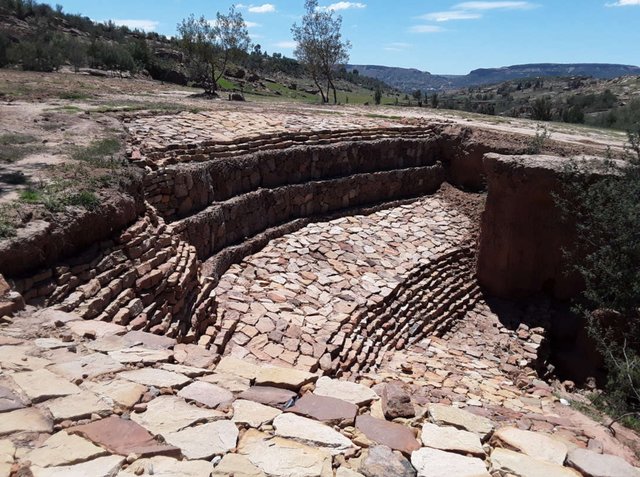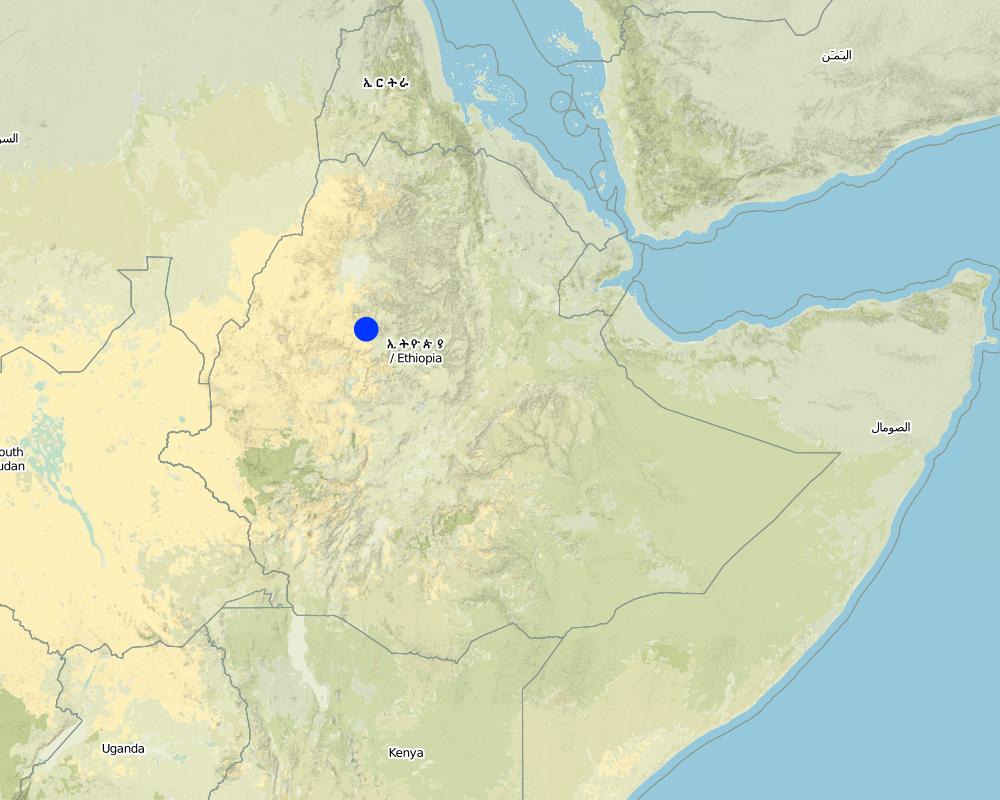Social Infrastructure for Soil Conservation [Etiópia]
- Criação:
- Atualização:
- Compilador/a: Hans Hurni
- Editor: –
- Revisor: Fabian Ottiger
approaches_2390 - Etiópia
Veja as seções
Expandir tudo Recolher tudo1. Informação geral
1.2 Detalhes do contato das pessoas capacitadas e instituições envolvidas na avaliação e documentação da abordagem
Nome da(s) instituição(ões) que facilitou(ram) a documentação/avaliação da Abordagem (se relevante)
CDE Centre for Development and Environment (CDE Centre for Development and Environment) - Suíça1.3 Condições em relação ao uso da informação documentada através de WOCAT
O/a compilador/a e a(s) pessoa(s) capacitada(s) aceitam as condições relativas ao uso de dados documentados através da WOCAT:
Sim
1.4 Referência ao(s) questionário(s) sobre tecnologias da GST

Gully head structure [Lesoto]
The aim of the gully head structure is to help stabilise the gully and prevent/control the gully from expanding further in length due to erosion. In Lesotho, this is constructed using stones.
- Compilador/a: Matoka Moshoeshoe
2. Descrição da abordagem de GST
2.1 Descrição curta da abordagem
Negotiation with the stakeholder community of a catchment on social incentives to be offered by external agency in exchange of additional inputs by the communty to be invested into soil and water conservation measures.
2.2 Descrição detalhada da abordagem
Descrição detalhada da abordagem:
Aims / objectives: The overall purposeof the approach is to achieve sustainable land management without direct incentives such as food-for-work, cash payment, etc. Instead, the community is contracted through a negotiation process to invest into conservation without any direct incentives. Instead, the community will be entitled to select a social investment in their territory which conforms to its most pressing needs, e.g. a clinic, a school, a road, etc. Specific objective is to persuade farmers of the virtue of sustainable land management without direct pay, and to show that outside help is tied to this long-term community commitment when investing into social infrastrcuture. In the end, this is a win-win situation because two goals are achieved with a much greater investment and commitment from the farmer side, while sustainable land management and social development are furthered.
2.5 País/região/locais onde a abordagem foi aplicada
País:
Etiópia
Região/Estado/Província:
Gojam
Map
×2.6 Datas de início e término da abordagem
Indique o ano de início:
1985
Ano de término (caso a abordagem não seja mais aplicada):
1988
2.7 Tipo de abordagem
- Baseado em projeto/programa
2.8 Principais metas/objetivos da abordagem
The Approach focused mainly on SLM with other activities (Area closure / cut & carry of grass. Clinic construction & facilitation.)
There is no document, but the SCRP goal is to support sustainable use of natural resources. In Anjeni this should be achieved through a specific incentive at social level.
The SLM Approach addressed the following problems: Accelerating soil erosion. Declining production of crops. Overland runoff destroying crops and producing gullies. Poor social infrastructure in community.
2.9 Condição que propiciam ou inibem a implementação de tecnologia/tecnologias aplicada(s) segundo a abordagem
Normas e valores sociais/culturais/religiosos
- Inibitivo
lack of community collaboration
Treatment through the SLM Approach: further processes of community development
Quadro institucional
- Inibitivo
lack of trained extensionists
Treatment through the SLM Approach: training supprt
Quadro jurídico (posse de terra, direitos de uso da terra e da água)
- Inibitivo
lack of land ownership
Treatment through the SLM Approach: clarify ownership and user rights
The existing land ownership, land use rights / water rights hindered a little the approach implementation But not much. Attitudes of farmers towards investments into their land remain negative.
3. Participação e papel das partes interessadas envolvidas
3.1 Partes interessadas envolvidas na abordagem e seus papéis
- Usuários de terra/comunidades locais
Groups of users organised through the project; Working land users were mainly men (Some women and children also participated.)
Women were less involved in planning and implementation of SWC, but more with social infrastructure. In Ethiopia, men traditionally do soil labour in field. The approach included all communities including all households.
- Governo nacional (planejadores, responsáveis pelas decisões)
Ministry of Agriculture
Ministry of Health
- Organização internacional
Caso várias partes interessadas foram envolvidas, indique a agência líder:
Expat: Overall principle of conservation for infrastructure approach. Nationals: Design of objectives, activities. Land users: Agreement on approach and specific designs of technology & maintenance.
3.2 Envolvimento do usuários de terra/comunidades locais nas diferentes fases da abordagem
| Envolvimento do usuários de terra/comunidades locais | Especifique quem estava envolvido e descreva as atividades | |
|---|---|---|
| Iniciação/motivação | Nenhum | |
| Planejamento | Passivo | interviews/questionnaires |
| Implementação | Passivo | responsibility for major steps |
| Monitoramento/avaliação | Passivo | public meetings; |
| Research | Nenhum |
3.4 Decisão sobre a seleção de tecnologia/tecnologias de GST
Especifique quem decidiu sobre a seleção de tecnologia/tecnologias a serem implementadas:
- Principalmente especialistas em GST, após consulta com usuários da terra
Explique:
consultative. Development of technology was based on existing indigenous technologies which were complemented and perennized. The approach was explained to the farmers, a 10ha demonstration area was established for one year, and the agreement was reached after that time to do it on 100 ha, if social infrastructure support was given.
Decisions on the method of implementing the SLM Technology were made by by SLM specialists alone (top-down). directive (top-down). Proposal by Development Agents was explained to farmers, and their consent used to organize the mass implementation campaign in 1987.
4. Suporte técnico, reforço das capacidades e gestão do conhecimento
4.1 Reforço das capacidades/ formação
Foi oferecida formação aos usuários da terra/outras partes interessadas?
Sim
Especifique quem foi capacitado:
- Usuários de terra
- SWC specialists (2), extensionists/trainers (1), politicians/decision makers (1)
Tipo de formação:
- Em exercício
- Áreas de demonstração
- Reuniões públicas
Assuntos abordados:
Technical design of SWC techniques. Institutions on maintenance & modifications.
4.2 Serviço de consultoria
Os usuários de terra têm acesso a um serviço de consultoria?
Sim
Especifique se foi oferecido serviço de consultoria:
- nas áreas dos usuários da terra
Descreva/comentários:
Name of method used for advisory service: Government Extension System.; Key elements: Holding of meetings., Technical layout of SWC techniques., Support in negotiations & follow-up.; 1) Mainly: government's existing extension system, Partly: projects own extension structure and agent; Extension staff: Mainly government employees 2) Target groups for extension: School children/students, Teachers; Activities: Demonstration visits to nearby catchment and preparation of a school b
Advisory service is inadequate to ensure the continuation of land conservation activities; Farmer to extensionist ratio is 1000:1 or worse. Educational status of all is low. Approach of extension still needs improvement.
4.3 Fortalecimento da instituição (desenvolvimento organizacional)
As instituições foram fortalecidas ou estabelecidas através da abordagem?
- Sim, moderadamente
Especifique a que nível (níveis) as instituições foram fortalecidas ou estabelecidas:
- Local
Especifique o tipo de apoio:
- Equipamento
4.4 Monitoramento e avaliação
Monitoramento e avaliação são partes da abordagem?
Sim
Comentários:
bio-physical aspects were regular monitored through observations
technical aspects were regular monitored through observations
socio-cultural aspects were regular monitored through observations
economic / production aspects were regular monitored through measurements
There were several changes in the Approach as a result of monitoring and evaluation: Technology was adapted according to farmers wishes, namely adjustments of narrow terraces by removing some, overlay of drainage system over terraces and not along them.
Monitoring & extension in still ongoing through SCRP, and since 1984 in Anjeni.
4.5 Pesquisa
A pesquisa foi parte da abordagem?
Sim
Especifique os tópicos:
- Sociologia
- Economia/Marketing
- Ecologia
- Tecnologia
- Land use dynamics, farming system.
Dê mais detalhes e indique quem realizou a pesquisa:
The treated catchment of Anjeni is part of a research set-up where continuous monitoring and evaluation is being carried out since 1984.
Research was carried out on-farm
5. Financiamento e apoio material externo
5.1 Orçamento anual para o componente de GST da abordagem
Caso o orçamento exato seja desconhecido, indique a faixa:
- 10.000-100.000
Comentários (p. ex. principais fontes de recursos/principais doadores):
Approach costs were met by the following donors: international (GDE/SCRP): 25.0%; government (national - Min. of Agriculture): 5.0%; local community / land user(s) (-): 70.0%
5.2 Apoio financeiro/material concedido aos usuários da terra
Os usuários da terra receberam apoio financeiro/material para a implementação de tecnologia/tecnologias?
Sim
5.3 Subsídios para entradas específicas (incluindo mão-de-obra)
- Equipamento
| Especifique quais entradas foram subsidiadas | Em que medida | Especifique os subsídios |
|---|---|---|
| Ferramentas | Totalmente financiado | Hand tools |
- Infraestrutura
| Especifique quais entradas foram subsidiadas | Em que medida | Especifique os subsídios |
|---|---|---|
| Community infrastructure | Parcialmente financiado | Support to clinic was 50% of cost of clinic only. |
Se a mão-de-obra pelos usuários da terra foi uma entrada substancial, isso foi:
- Voluntário
Comentários:
In exchange of SWC works support to clinic was given as an overall incentive.
5.4 Crédito
Foi concedido crédito segundo a abordagem para atividades de GST?
Não
6. Análise de impactos e declarações finais
6.1 Impactos da abordagem
A abordagem auxiliou os usuários da terra a implementar e manter as tecnologias de GST?
- Não
- Sim, pouco
- Sim, moderadamente
- Sim, significativamente
Traditional soil fertility management was already exhaustively used under the given farming system.
A abordagem melhorou as questões de posse de terra/diretos do usuário que inibiam a implementação das tecnologias de GST?
- Não
- Sim, pouco
- Sim, moderadamente
- Sim, significativamente
The problem is unlikely to be overcome in the near future. Present government insists on state ownership of land.
Did other land users / projects adopt the Approach?
- Não
- Sim, pouco
- Sim, moderadamente
- Sim, significativamente
A large programme in Merhabete involving 2,000 ha and about 10,000 people adopted a similar system, however with a technology that was suitable to their area (level bunds).
6.3 Atividades de sustentabilidade de abordagem
Os usuários da terra podem manter o que foi implementado através da abordagem (sem apoio externo)?
- Não
Caso negativo ou incerto, especifique e comente:
Social incentives will have to come from outside (government or NGO)
6.4 Pontos fortes/vantagens da abordagem
| Pontos fortes/vantagens/oportunidades na visão do usuário da terra |
|---|
| Fulfillment of community needs (How to sustain/ enhance this strength: Co-ordination and participatory approach) |
| All catchment land users do conservation jointly together (How to sustain/ enhance this strength: Community versus individual approach) |
| Pontos fortes/vantagens/oportunidades na visão do/a compilador/a ou de outra pessoa capacitada |
|---|
| Negotiation processes (How to sustain/ enhance this strength: Train extensionists) |
| Social incentives (How to sustain/ enhance this strength: Better cooperation between different ministries on their activities as a package) |
6.5 Pontos fracos, desvantagens da tecnologia e formas de superá-los
| Pontos fracos/desvantagens/riscos na visão do usuário da terra | Como eles podem ser superados? |
|---|---|
| Combining two goals necessitates more labour inputs | No solution |
| Pontos fracos/vantagens/riscos na visão do/a compilador/a ou de outra pessoa capacitada | Como eles podem ser superados? |
|---|---|
| Tieing social investments with soil conservation is politically difficult because two goals are pursued with one instrument | No option but continue |
| Interest may still be initiated basically from need and less from degradation | Awareness needs to be furthered still |
7. Referências e links
7.1 Métodos/fontes de informação
- visitas de campo, pesquisas de campo
- entrevistas com usuários de terras
7.2 Referências às publicações disponíveis
Título, autor, ano, ISBN:
SCRP Progress Reports
Disponível de onde? Custos?
SCRP, Addis Abeba
Título, autor, ano, ISBN:
Book Learning from Anjeni' (Amharic)'
Disponível de onde? Custos?
Min. of Education, Bahr Dar
Título, autor, ano, ISBN:
SCRP Research Reports
Disponível de onde? Custos?
SCRP, Addis Abeba
Links e módulos
Expandir tudo Recolher tudoLinks

Gully head structure [Lesoto]
The aim of the gully head structure is to help stabilise the gully and prevent/control the gully from expanding further in length due to erosion. In Lesotho, this is constructed using stones.
- Compilador/a: Matoka Moshoeshoe
Módulos
Não há módulos


